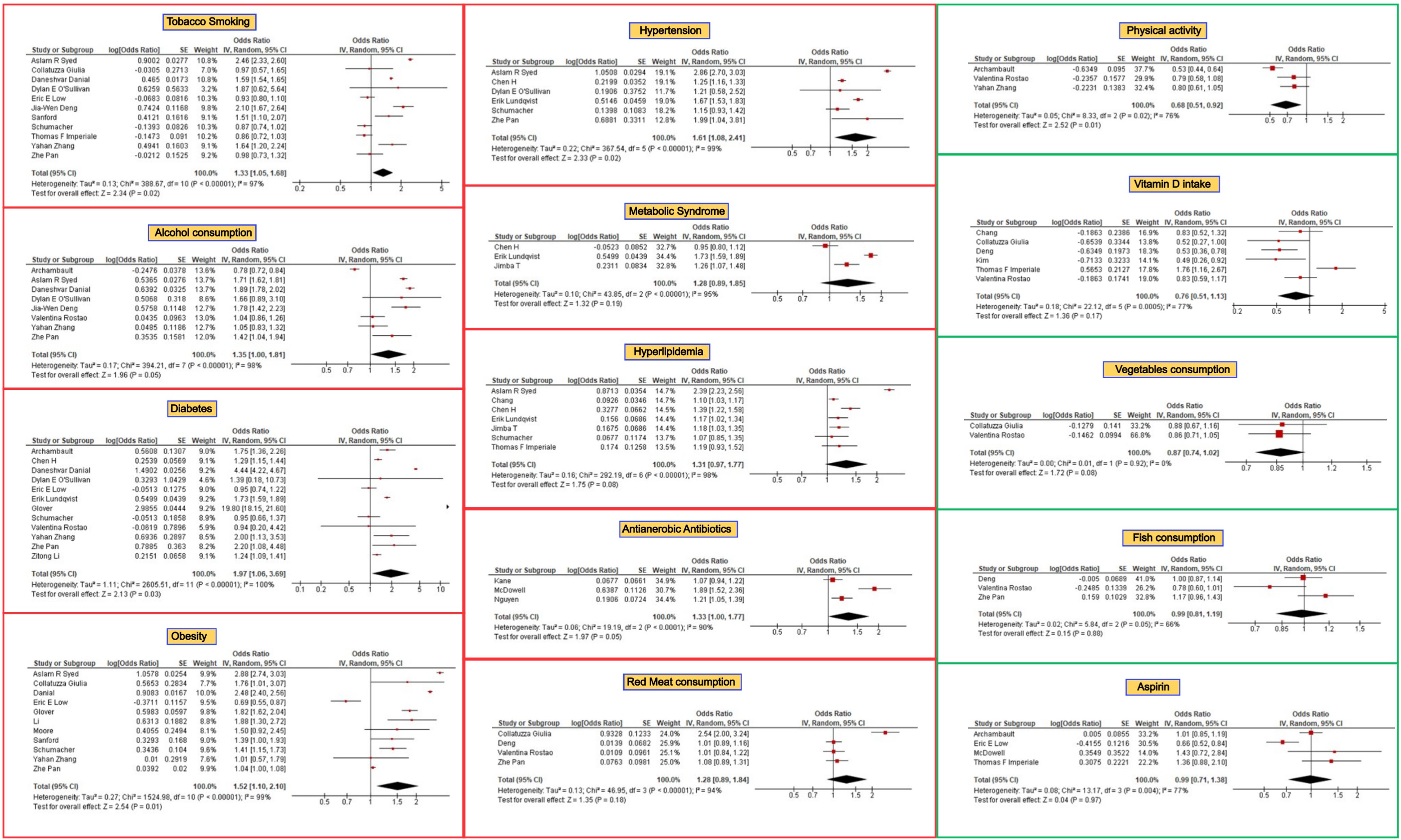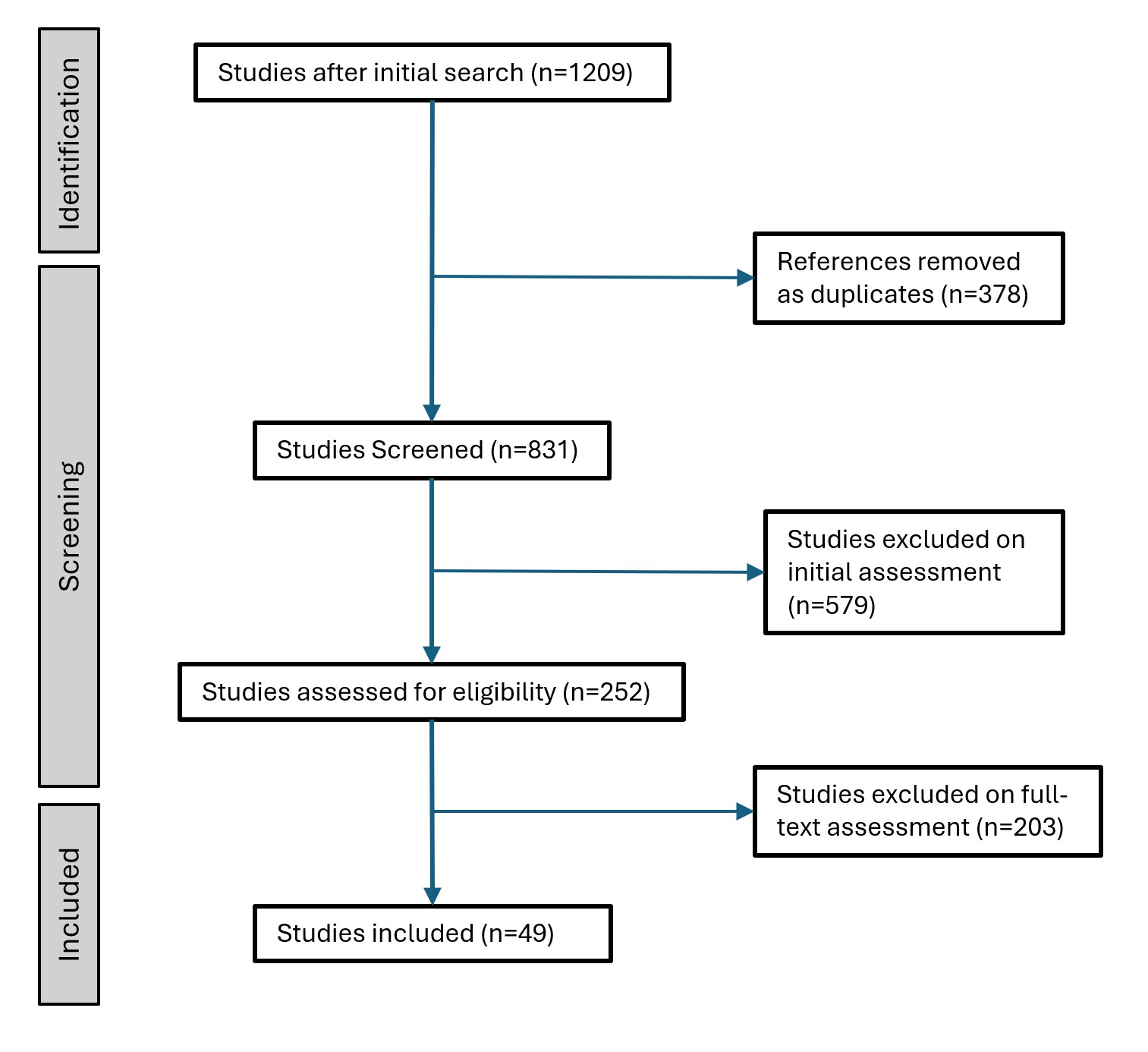Sunday Poster Session
Category: Colorectal Cancer Prevention
P0499 - Modifiable Determinants of Early-Onset Colorectal Cancer: A Systematic Review and Meta-Analysis
Sunday, October 26, 2025
3:30 PM - 7:00 PM PDT
Location: Exhibit Hall

Shruti Jain, MD (she/her/hers)
LSU Health
Shreveport, LA
Presenting Author(s)
Award: ACG Presidential Poster Award
Rohit Goyal, MD1, Shruti Jain, MBBS2, Viraj Panchal, MBBS2, Karan Sachdeva, MD3, Rishi Chowdhary, MD4, Lovekirat Dhaliwal, MD5, Anjul Verma, MD6, Sudha Pandit, MD1
1Louisiana State University, Shreveport, LA; 2Louisiana State University Health, Shreveport, LA; 3LSU Health, Shreveport, LA; 4Case Western Reserve University / MetroHealth, Cleveland, OH; 5Emory University Hospital, Atlanta, GA; 6Texas Tech University Health Sciences Center, Odessa, TX
Introduction: Despite an overall decline in the incidence of colorectal cancer (CRC) in the last few decades, the incidence of CRC in younger adults ( < 50 years), early-onset CRC (EOCRC), is on the rise. Several risk factors have been described as linked with EOCRC. With poorer survival outcomes associated with EOCRC, it is essential to explore all the modifiable risk factors impacting the incidence of EOCRC.
Methods: We conducted a comprehensive literature search using PubMed, Embase, and Google Scholar, from inception through February 2025, to identify all the published studies analyzing any risk and protective factors for EOCRC. We included observational studies that were either limited to EOCRC cases or provided age-stratified incidence and compared the incidence to disease-free or risk-free controls. Two independent reviewers screened titles, abstracts, and full texts. Random-effects meta-analyses were performed to pool effect estimates, and heterogeneity was quantified using the I² statistic.
Results: From 1209 initial citations, a total of 49 studies were included, as shown in Figure 1. The forest plots for different factors for the risk of developing EOCRC are shown in Figure 2. Significant risk factors for EOCRC were chronic comorbidities, including diabetes mellitus [OR=1.97 (1.06-3.69)], hypertension [OR=1.61 (1.08-2.41)], obesity [OR=1.52 (1.10-2.10)], lifestyle factors including tobacco smoking [OR=1.33 (1.05-1.68)], alcohol consumption [OR=1.35 (1.00-1.81)], and antibiotic use, both anti-anerobic [OR=1.33 (1.00-1.77)] and anti-aerobic [OR=1.33 (1.02-1.72)]. Metabolic syndrome (OR=1.28), hyperlipidemia (OR=1.31), and red meat consumption (OR = 1.28) increased the risk but did not reach significance. Having good physical activity was the only protective factor that reached statistical significance [OR=0.68 (0.51-0.92)]. Vitamin D intake (OR=0.76), vegetable consumption (OR=0.87) reduced the risk non-significantly, and aspirin intake (OR=0.99) and fish consumption (OR=0.99) played no role.
Discussion: Our study identifies and quantifies the modifiable factors influencing the incidence of EOCRC. With the rising incidence and poorer outcomes of EOCRC, it is vital to recognize and direct interventions towards the at-risk populations.

Figure: Figure 1: PRISMA flow diagram showing the inclusion of studies

Figure: Figure 2: Forest plots for different factors influencing the risk of developing EOCRC
Disclosures:
Rohit Goyal indicated no relevant financial relationships.
Shruti Jain indicated no relevant financial relationships.
Viraj Panchal indicated no relevant financial relationships.
Karan Sachdeva indicated no relevant financial relationships.
Rishi Chowdhary indicated no relevant financial relationships.
Lovekirat Dhaliwal indicated no relevant financial relationships.
Anjul Verma indicated no relevant financial relationships.
Sudha Pandit: Medtronic – Product feedback.
Rohit Goyal, MD1, Shruti Jain, MBBS2, Viraj Panchal, MBBS2, Karan Sachdeva, MD3, Rishi Chowdhary, MD4, Lovekirat Dhaliwal, MD5, Anjul Verma, MD6, Sudha Pandit, MD1. P0499 - Modifiable Determinants of Early-Onset Colorectal Cancer: A Systematic Review and Meta-Analysis, ACG 2025 Annual Scientific Meeting Abstracts. Phoenix, AZ: American College of Gastroenterology.
Rohit Goyal, MD1, Shruti Jain, MBBS2, Viraj Panchal, MBBS2, Karan Sachdeva, MD3, Rishi Chowdhary, MD4, Lovekirat Dhaliwal, MD5, Anjul Verma, MD6, Sudha Pandit, MD1
1Louisiana State University, Shreveport, LA; 2Louisiana State University Health, Shreveport, LA; 3LSU Health, Shreveport, LA; 4Case Western Reserve University / MetroHealth, Cleveland, OH; 5Emory University Hospital, Atlanta, GA; 6Texas Tech University Health Sciences Center, Odessa, TX
Introduction: Despite an overall decline in the incidence of colorectal cancer (CRC) in the last few decades, the incidence of CRC in younger adults ( < 50 years), early-onset CRC (EOCRC), is on the rise. Several risk factors have been described as linked with EOCRC. With poorer survival outcomes associated with EOCRC, it is essential to explore all the modifiable risk factors impacting the incidence of EOCRC.
Methods: We conducted a comprehensive literature search using PubMed, Embase, and Google Scholar, from inception through February 2025, to identify all the published studies analyzing any risk and protective factors for EOCRC. We included observational studies that were either limited to EOCRC cases or provided age-stratified incidence and compared the incidence to disease-free or risk-free controls. Two independent reviewers screened titles, abstracts, and full texts. Random-effects meta-analyses were performed to pool effect estimates, and heterogeneity was quantified using the I² statistic.
Results: From 1209 initial citations, a total of 49 studies were included, as shown in Figure 1. The forest plots for different factors for the risk of developing EOCRC are shown in Figure 2. Significant risk factors for EOCRC were chronic comorbidities, including diabetes mellitus [OR=1.97 (1.06-3.69)], hypertension [OR=1.61 (1.08-2.41)], obesity [OR=1.52 (1.10-2.10)], lifestyle factors including tobacco smoking [OR=1.33 (1.05-1.68)], alcohol consumption [OR=1.35 (1.00-1.81)], and antibiotic use, both anti-anerobic [OR=1.33 (1.00-1.77)] and anti-aerobic [OR=1.33 (1.02-1.72)]. Metabolic syndrome (OR=1.28), hyperlipidemia (OR=1.31), and red meat consumption (OR = 1.28) increased the risk but did not reach significance. Having good physical activity was the only protective factor that reached statistical significance [OR=0.68 (0.51-0.92)]. Vitamin D intake (OR=0.76), vegetable consumption (OR=0.87) reduced the risk non-significantly, and aspirin intake (OR=0.99) and fish consumption (OR=0.99) played no role.
Discussion: Our study identifies and quantifies the modifiable factors influencing the incidence of EOCRC. With the rising incidence and poorer outcomes of EOCRC, it is vital to recognize and direct interventions towards the at-risk populations.

Figure: Figure 1: PRISMA flow diagram showing the inclusion of studies

Figure: Figure 2: Forest plots for different factors influencing the risk of developing EOCRC
Disclosures:
Rohit Goyal indicated no relevant financial relationships.
Shruti Jain indicated no relevant financial relationships.
Viraj Panchal indicated no relevant financial relationships.
Karan Sachdeva indicated no relevant financial relationships.
Rishi Chowdhary indicated no relevant financial relationships.
Lovekirat Dhaliwal indicated no relevant financial relationships.
Anjul Verma indicated no relevant financial relationships.
Sudha Pandit: Medtronic – Product feedback.
Rohit Goyal, MD1, Shruti Jain, MBBS2, Viraj Panchal, MBBS2, Karan Sachdeva, MD3, Rishi Chowdhary, MD4, Lovekirat Dhaliwal, MD5, Anjul Verma, MD6, Sudha Pandit, MD1. P0499 - Modifiable Determinants of Early-Onset Colorectal Cancer: A Systematic Review and Meta-Analysis, ACG 2025 Annual Scientific Meeting Abstracts. Phoenix, AZ: American College of Gastroenterology.

